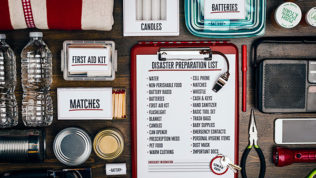Disasters can happen anytime…anywhere…to anyone: Be prepared.
The past decade brought an ever-increasing number of natural disasters and other catastrophic events, affecting people and property. Make sure you are ready for the next one by having an emergency plan in place.
You’ll also want to prepare supplies to sustain your household for at least three days, maybe longer. In a major disaster, it might take several days to restore vital services and get help from first responders and local authorities.
EMERGENCY PLANNING TIPS
- Stay informed about the different emergencies that could occur in your community and identify appropriate responses
- Make a family emergency plan and practice it regularly
- Consider becoming certified in CPR and first aid
- Build an emergency supply kit
- Get involved in your community’s emergency planning
- Recognize that emergency planning is a continuing process
EMERGENCY SUPPLY KITS
Building an emergency supply kit is crucial to ensure you are prepared to meet the needs of your household. Plan to store items in an easy-to-carry bag, and consider preparing two kits:
- One should include everything you will need to stay where you are and make it on your own until help arrives.
- The other should be a lightweight, smaller version you can take with you if evacuation is required. These are typically referred to as “Go Bags”, “72-hour bags” or “bug-out bags.”
Customize your kit to reflect your family’s unique needs – consider family members’ ages, existing medical needs or physical limitations and even your pets. The American Red Cross lists additional items to consider. As your family grows and changes, your needs may also change. Be sure to update your kit annually to make sure it still addresses your family’s circumstances.
Store your kits in a location that’s easily accessible to all members of your household. Practice locating your supply kit when you practice your emergency procedures.
ON THE GO
In addition, it is crucial to keep a kit in your vehicle or workplace in case you are stranded during an emergency. When preparing your emergency plan, think about the places where your family spends time such as school, work and other places you frequent.
Preparing for an emergency in advance ensures you can handle a crisis more safely and comfortably. Although being prepared may not prevent a disaster, it will give you confidence to meet the difficult challenges that may arise.
MORE INFORMATION
Learn more about how to become personally prepared during an emergency from the U.S. Department of Homeland Security at www.ready.gov.
Additional emergency preparedness resources can be found at https://www.redcross.org/get-help/how-to-prepare-for-emergencies.
The Red Cross also offers specific information to help you take precautions against COVID-19 while preparing for a natural disaster.
This loss control information is advisory only. The author assumes no responsibility for management or control of loss control activities. Not all exposures are identified in this article. Contact Landmark Risk Management & Insurance for insurance coverage advice and loss control information.

